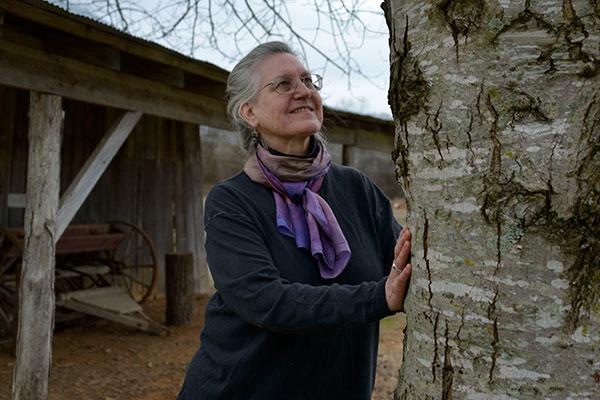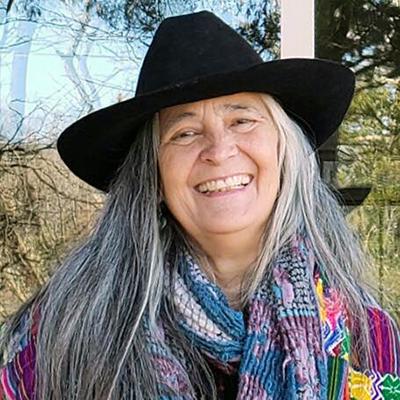
By Diana Turnbow, research assistant for the Smithsonian American Women’s History Museum
In the mountainous region of the United States known as the Ozarks, women have long been respected for their knowledge of plants and healing. The 2023 Smithsonian Folklife Festival program, The Ozarks: Faces and Facets of a Region features the work of women in agriculture, foodways, and health and wellness. The Smithsonian Folklife Festival received Federal support from the Smithsonian American Women’s History Initiative Pool to construct a teaching garden and foodways kitchen and bring presenters like plant expert and herbalist Sasha Daucus and traditional healer Maria Cristina Moroles to the festival.
Finding the Ozarks
Covering parts of Missouri, Arkansas, northeast Oklahoma, and southeast Kansas, the Ozarks support thousands of species of plants and animals. Its people and culture are equally diverse, shaped by a history of migration and adaptation.
In the early 1970s, inexpensive land and a tolerance for individuality led to the formation of intentional living communities in the Ozarks. Seeking a more peaceful way of life grounded in the land, people formed communities based on social equality and communal living. A number of these communities focused on the needs of women and children.
Sasha Daucus and Maria Cristina Moroles were two women who came to experience intentional living communities in Missouri and Arkansas. A connection to the land convinced them to stay. They developed knowledge and healing practices using plants from the region.
Plant Expert and Herbalist Sasha Daucus

Sasha Daucus is an herbalist and expert in Ozark plants who has made her home in southeastern Missouri. In 1981, while visiting her sister at the East Wind Intentional Community in Tecumseh, Missouri, she met and fell in love with a local midwife, Mau Blossom. Struck by the natural beauty of the Ozarks, Daucus developed expertise in the local plants and their medicinal uses to support Blossom’s midwife practice. She is at the forefront of herbalists working to reclaim traditional knowledge of plants and mentor others in their use.
As a regional expert, Daucus worked with the Smithsonian’s Center for Folklife and Cultural Heritage to interview other women who use plants in traditional and innovative ways for The Ozarks: Faces and Facets of a Region program at this year’s Folklife Festival. Daucus will talk about the Ozarks as a plant haven, along with leading workshops about herbs that strengthen the immune system and calm the nerves, throughout the festival. Search the festival schedule for Sasha Daucus to see the dates and times of her presentations.
Traditional Healer Maria Cristina Moroles

Maria Cristina Moroles, photograph courtesy of the Smithsonian Folklife Festival
Maria Cristina Moroles is a two-spirit woman of Mexican and indigenous descent. She is the matriarchal steward of Santuario Arco Iris (Rainbow Sanctuary), an intentional living community focused on women and children of color in Newton County, Arkansas. Santuario Arco Iris occupies land formerly owned by the Sassafras Women’s Community, a lesbian land collective. Moroles has lived on the land since 1976 and has fostered a community grounded in indigenous, ecofeminist, and anti-racist principles.
Moroles cares for her community, and others who seek her out, as a healer and spiritual advisor. Known as a curandera, a traditional healer in Mexican indigenous culture, she provides limpias (cleansings) and energy healings, along with herbal remedies. Moroles trained and consulted with a wide range of healers, shamans, psychics, and social justice advocates to hone her skills as a curandera. She is also an herbalist, licensed massage therapist, and ceremonial sweat lodge keeper..
Moroles will be performing baños espirituales (spiritual baths), as well as speaking about food and plant-based spiritual practices at the Smithsonian Folklife Festival. Find dates and times of her presentations and workshops by searching the festival schedule for Maria Cristina Moroles.
The Smithsonian Folklife Festival takes place on the National Mall (see festival map) June 29-30 and July 1-4 and 6-9, 2023 from 11:00 am to 5:30 pm. Search the festival schedule to find the programs taking place in the Teaching Garden and Foodways Kitchen.
The Smithsonian American Women’s History Initiative Pool is administered by the Smithsonian American Women’s History Museum.